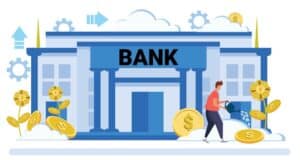I understand that it can sometimes be intimidating and uncomfortable to go into a bank, especially starting out. However, if you have proper preparation and knowledge, you’ll find that establishing and maintaining a good banking relationship is both possible and critically important when it comes to buying and owning rental property.
First, for people who are inexperienced with banking, I think it’s important to realize that banking is a business transaction—both parties are going to benefit. The bank wants profitable transactions to build a reliable book of business and produce income. Loan interest is a very important source of revenue, so banks are actively looking for people who are good loans. If you are a qualified, credit-worthy individual, a good bank should want to loan you money.
Choosing a Banker:
It’s important to understand the difference between consumer banking and commercial banking (see this article to learn more: Four Critical Concepts of Banking). When looking for a loan for real estate properties, you’ll need to go to a commercial loan officer—a consumer banker will not loan you money for a commercial venture like rental property.
Before you look at rental properties, it could be helpful to find a few commercial bankers that you are interested in doing business with. I think the best place to start is wherever you bank regularly. Your home bank is already familiar with you as a customer. They know your payment history, your financial management ability, and likely already have all your personal information.
Along with your regular bank, I recommend making contact with at least two other banks. Chances are you also know several small business owners who can give you banking recommendations. Personally, I prefer local or regional banks—I think they are more willing to work with you, and I find that national banks can sometimes be inflexible—especially in an economic downturn. As you look for other banks, also keep in mind that different sized banks have different loaning capabilities.
After you compile a list of potential banks, it’s time to go meet the commercial loan officers. It’s important that you feel comfortable with the banker(s) you eventually choose, so be honest with him or her up front. Let each banker know what your vision is and then ask him or her the following questions:
- What makes for a good real estate loan and/or a good customer for the bank?
- What do you look for in a pro forma?
- It may be a good idea to take a sample pro forma with you. This way, the banker can check your assumptions and numbers and adjust them based on his or her own concerns. From here, he or she can show you the percentages and ratios that the bank is looking for, ultimately giving you a head start when you have to create a project-specific pro forma moving forward.
- What are the terms of the loan?
For example:
- How long will you lock the loan for? (When you’re first starting out, I would recommend looking for a 3-year lock…read more about locks here)
- What is your typical amortization period on rental property?
- What is your current interest rate on rental property?
- What other fees are associated with rental property loans?
- What percentage of the purchase price do you typically require as a down payment?
- What is your lending authority or limit before it goes to committee? (Depending on the amount you borrow, the loan may require a committee’s approval)
- What is your lead time on approving the loan?
- Will you require an actual appraisal, or can you do an in-house appraisal?
- Can I get a stabilization period while I get the house initially rented? (This is especially relevant if the rental house needs work)
- If a house needs work, can I put less money down and then use additional, cash-out-of-pocket funds to make repairs and let that stand as my equity in the property?
- What is your single-borrower limit?
Based on the answers each banker gives you, you can create a funnel for filtering down your top banks and finding the best deal. Getting a bank all of your background documentation can be quite laborious. I recommend that you narrow your banking options down to no more than two banks. This will help you be much more efficient. Be prepared that the bank will ask you for the following documents:
- Personal Financial Statement
- A personal financial statement is a balance sheet. It will list your net worth, assets, and liabilities.
- Budget
- If you have an official budget, that’s great. If not, banks will have a standard form for you to fill out that lists your monthly income and your monthly expenses. Here, the banker wants to make sure that you’ll have the cash flow available to make payments in case something goes wrong. They may also look at your savings, how much debt you have, and if you’re responsible with the money you already have. (To see some thoughts on building a budget, click here)
- Credit Check
- You’ll need to give the bank permission to run a credit check on you. Typically, you’ll need a minimum score of ~700 to get a decent rate and loan for an investment property. The higher your credit score, the better deal you’re likely to get.
- You will need to be prepared to talk through any issues on your credit report. Personally, I use LifeLock to monitor my credit scores and reports. LifeLock (or other services) can allow you access to your report and anything listed on it.
- Global Cash Flow Analysis (in certain cases)
- If you own your own business and your personal finances are complex enough, banks may want to perform a global cash flow analysis. Here, they look at all of your entities, businesses, and investments to see how liquid you are.
- 3-Years Previous Tax Returns
- Income Verification (W-2s, etc.)
After the banker reviews all your paperwork, ask him or her to help you understand what your borrowing power is. Doing so will show you your purchasing ability. Here, it may be helpful to have a sample pro forma on hand again.
Once you’re comfortable with a banker and know your purchasing ability, it’s time to find what property you want to buy. As you shop, it’s critical that you build a real pro forma based on the properties you evaluate and on the advice the bank has given you. Such a pro forma can help you discern what to buy and what not to buy, helping you understand your cash flow expectations and budget necessities. The pro forma will also give you confidence that what you take back to the bank will have the bank’s approval. The more you understand the bank’s criteria and language, the more success you will have establishing an early relationship with a banker and closing a deal.
Back to the deal—after you return with a property in mind and a specific pro forma, the banker will decide whether or not to give you a loan. He or she will reference the loan policy and, if necessary, the approval of a committee. Hopefully, you’ll be able to close on a deal and feel confident in your banking relationship!
Maintaining Your Banking Relationship:
Even after you’ve gone through the meticulous process of establishing a banking relationship, it’s essential to maintain a healthy relationship with your banker moving forward.
Remember, banks are ultimately loaning against your reputation and your credibility. One of the greatest things you can do to build your credibility and maintain a good banking relationship is to manage your financial information in a proactive and responsible manner. Financial information is generally good for a year, so when it’s time to send in new paperwork, make sure you’re on time and orderly. If you do quarterly financials, which I highly recommend, proactively send them to your banker when they’re finalized.
As you navigate your banking relationships, it’s also important to maintain a fair level of competition. Here’s what I mean by that: loan officers will often try to entice you into a relationship with a bank using low rates, low fees, etc. The longer you stay at a bank, however, the more fees and interest rate they’re going to charge you. With this being said, I believe in the fairness of competition, and I would say it’s smart to shop around for loans at three different banks as you continue to grow your business. By doing so, you can understand what the base value of a loan should be. As your business expands and gets more complex, it’s in your best interest to deal with more than one bank to make sure you’re getting fair treatment. Remember, banking is a partnership, and the bank will have to make money off your relationship for a deal to be worth it for them, so don’t get hyper focused on beating them up on every deal.
If you and your banker respect one another, he or she is likely to understand the competition and will work with you to maintain a fair deal. As long as you continue to be a responsible, transparent customer, your banking relationship should help you find success in rental property.
In Summary:
- Don’t be intimidated by establishing a relationship with a banker. If you go into banks ready to learn and with a list of questions prepared, you’re sure to find a banker that you’re comfortable doing business with.
- Show your bankers your paperwork and pro formas and ask for their feedback to better understand their language and criteria. This will help you evaluate properties, make smart purchases, and develop more accurate pro formas.
- Be a good customer. Proactively managing your financial information is a good way to maintain a healthy banking relationship.
- Be competitive. Shop around for loans at three different banks to make sure you’re getting a fair deal. Bankers understand competition, so be honest in your banking relationships.

